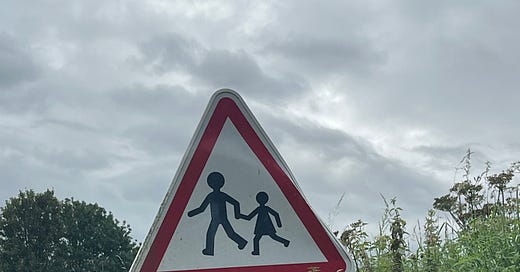There’s a lot said in schools about the importance of mastery learning and how children need to be made to practice in order to develop their skills. But there’s another very important stage of children’s learning, which, once children grow past it, can’t be repeated. It’s discovery learning. The sort of learning where children explore and ask questions incessantly. The sort of learning where they play.
Discovery learning is not inferior to mastery learning. We don’t need to move children on from discovery learning to mastery learning. They explore the world, driven by their wish to participate and experiment. Discovery learning is broad, wide-ranging and unpredictable. A lot of it happens through play.
As children grow towards puberty, their brains change and they start to develop the skills necessary for mastery learning. Mastery learning is quite different. It’s about becoming good at doing things through practice. You do something every day, and you become skilled at it. Mastery learning is important - but it also has limitations. It’s more rigid than discovery learning. More specialised and less general. More specific and less broad ranging. A strong foundation of discovery learning enables children to become effective mastery learners.
This change does not have to be forced. We don’t have to make six year olds practice things in order that they grow up into adults who are capable of mastery learning. The change is neurological. As adults, we tend to over-value mastery learning and under-value discovery learning. We enforce practice on children who just want to play. We despair of their tendency to flit from thing to thing, and don’t value the way that they move so fluidly between interests.
Discovery learning is not inferior to mastery learning. It’s not a stage to be rushed through, to get to the ‘real learning’. Discovery learning is the foundation of how humans learn. Our children need us to make space for play
.





Well, this is so reassuring: knowing that I have nothing special to do for my kids apart from letting them explore the world and keeping them away from the conditioning I got throughout my life.
I would like to add to this that Children have a Right to Play (UN CRC Art. 31) "to rest and leisure, to engage in play and recreational activities appropriate to the age of the child and and to participate freely in cultural life and the arts."
In their General Comment #17 in 2013, they define Play as follows (emphasis mine):
Children’s play is any behaviour, activity or process initiated, CONTROLLED and STRUCTURED BY CHILDREN themselves; it takes place whenever and wherever opportunities arise. Caregivers may contribute to the creation of environments in which play takes place, but play itself is NON-COMPULSORY, driven by intrinsic motivation and UNDERTAKEN for its OWN SAKE, RATHER THAN AS A MEANS TO AN END. Play involves the exercise of autonomy, physical, mental or emotional activity, and has the potential to take infinite forms, either in groups or alone. These forms will change and be adapted throughout the course of childhood. The key characteristics of play are fun, uncertainty, challenge, flexibility and NON-PRODUCTIVITY. Together, these factors contribute to the enjoyment it produces and the consequent incentive to continue to play. While play is often considered non-essential, the Committee reaffirms that it is a fundamental and vital dimension of the pleasure of childhood, as well as an essential component of physical, social, cognitive, emotional and spiritual development
The reason I emphasised certain sections is because there's an abomination called "Play Based Learning" where Adults direct and control play in order to achieve outcomes set by the adult.